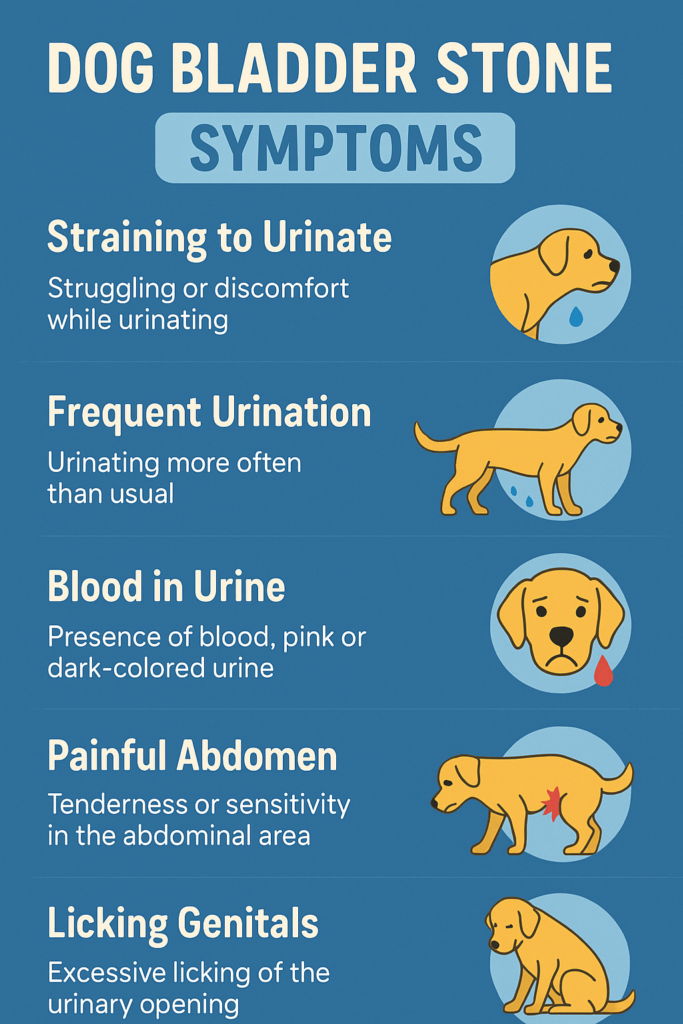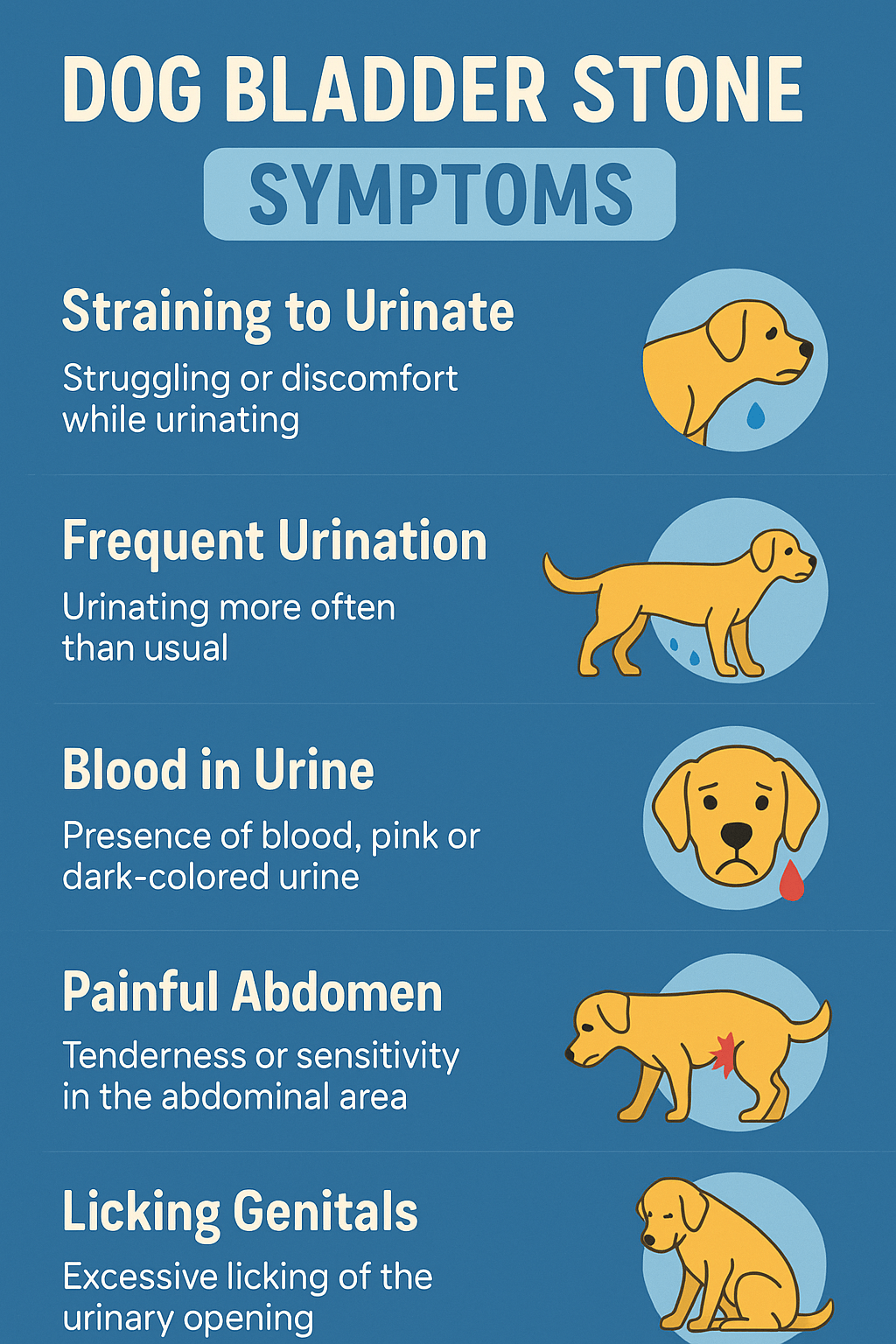Dog Bladder Stone Symptoms: What Every Pet Owner Should Know
Bladder stones, also known as uroliths, are mineral formations that can develop in a dog’s urinary tract. While some dogs may show no symptoms at all, others can experience significant discomfort and even life-threatening complications. Recognizing the signs of bladder stones early is crucial for ensuring your dog receives prompt treatment and avoids further health issues. From frequent urination to visible blood in the urine, understanding these symptoms can help you act quickly and effectively. In this blog post, we’ll explore everything you need to know about dog bladder stone symptoms, their causes, and how to address them.
Expert Insight on Diagnosing Bladder Stones in Dogs
“Your vet will recommend an evaluation of your dog’s urine and blood for diagnosis. The most common methods for screening the urinary tract are ultrasound and X-rays. Most stones tend to show on the X-rays. But if the stones are not visible, a gas or contrast agent may be introduced into your dog’s urinary tract. This allows the stones to show up in the imaging test.”
Common Symptoms of Dog Bladder Stones
Bladder stones can manifest in various ways, depending on their size, location, and composition. Here are the most common symptoms pet owners should watch for:
Frequent Urination:
Dogs with bladder stones often feel the urge to urinate more frequently than usual, even if only small amounts are passed.Straining to Urinate:
Your dog may appear to be in pain or discomfort while attempting to urinate, indicating possible obstruction or irritation.Blood in the Urine:
Hematuria, or the presence of blood in the urine, is a telltale sign of bladder stones and should never be ignored.Accidents in the House:
A previously house-trained dog may begin having accidents indoors due to the urgency caused by bladder irritation.Licking Genital Area Excessively:
Dogs may lick their genital area more often as a response to discomfort or pain caused by bladder stones.
If you notice any of these symptoms, it’s essential to consult your veterinarian promptly to determine the underlying cause and prevent complications.

Types of Bladder Stones and Their Causes
Bladder stones come in different types, each with unique characteristics and contributing factors. Understanding the differences can help guide treatment and prevention strategies.
Struvite Stones:
These stones form due to infections in the urinary tract and are composed of magnesium, ammonium, and phosphate.Calcium Oxalate Stones:
Often linked to dietary imbalances, these stones are harder to dissolve and typically require surgical removal.Urate Stones:
Common in certain breeds like Dalmatians, urate stones result from high levels of uric acid in the urine.Cystine Stones:
Caused by a genetic disorder, cystine stones are rare but tend to recur if not managed properly.Silicate Stones:
Associated with diets high in silicate-rich foods, these stones are less common but equally problematic.
Each type of stone has specific risk factors and treatment options, making accurate diagnosis critical for effective management.
Check this guide 👉Male Dog Bladder Infection Symptoms: Best 7 Expert Tips!
Check this guide 👉Bladder Cancer in Dogs: Best 7 Expert Tips!
Check this guide 👉Understanding Thickened Bladder Wall in Dogs: Best 7 Tips!
Symptoms of Bladder Stones | Potential Causes of Bladder Stones |
|---|---|
Frequent urination | Urinary tract infections (UTIs) |
Straining during urination | Dietary imbalances or deficiencies |
Blood in the urine | Genetic predisposition |
Accidents in the house | Dehydration or concentrated urine |
Excessive licking of genital area | High mineral intake in food |
Diagnosis and Treatment Options for Bladder Stones
Diagnosing and treating bladder stones requires veterinary expertise. Early intervention can prevent complications and improve your dog’s quality of life.
Veterinary Examination:
A thorough physical exam and discussion of symptoms help veterinarians narrow down potential causes.Urinalysis and Imaging:
Urine tests and imaging techniques like X-rays or ultrasounds are used to confirm the presence and type of bladder stones.Dietary Changes:
Specialized diets can dissolve certain types of stones, such as struvite stones, over time.Medication:
Antibiotics may be prescribed to treat underlying infections, while medications can help manage pain and inflammation.Surgical Removal:
For stubborn stones that cannot be dissolved, surgery may be necessary to remove them safely.
Prompt diagnosis and tailored treatment plans are essential for addressing bladder stones effectively and preventing recurrence.
Preventing Bladder Stones in Dogs
Prevention is always better than cure when it comes to bladder stones. By taking proactive steps, you can reduce the risk of your dog developing this painful condition.
Provide Plenty of Fresh Water:
Encourage hydration by ensuring your dog has constant access to clean, fresh water.Feed a Balanced Diet:
Choose high-quality dog food that meets your pet’s nutritional needs and avoids excessive minerals.Monitor Urine pH Levels:
Regularly check your dog’s urine pH, as abnormal levels can contribute to stone formation.Schedule Routine Vet Visits:
Regular check-ups allow veterinarians to detect early signs of urinary issues before they escalate.Avoid Overfeeding Treats:
Limit treats and table scraps, which can disrupt your dog’s dietary balance and increase stone risk.
By adopting these preventive measures, you can help keep your dog’s urinary system healthy and minimize the likelihood of bladder stones.
Risk Factors for Bladder Stones
Certain factors increase a dog’s risk of developing bladder stones. Being aware of these risks can help you take preventive action and monitor your pet’s health more closely.
Genetic Predisposition:
Some breeds are more likely to develop specific types of stones due to inherited traits.Dehydration:
Insufficient water intake can lead to concentrated urine, creating an environment where stones form.Poor-Quality Diet:
Low-quality food with excessive minerals or additives can contribute to stone development.Recurrent Urinary Tract Infections:
Chronic UTIs can lead to the formation of struvite stones, requiring ongoing management.Age and Gender:
Older dogs and male dogs are statistically more prone to bladder stones than younger or female dogs.
Understanding these risk factors allows you to tailor your dog’s care plan to minimize their chances of developing bladder stones.
Home Care Tips for Dogs Recovering from Bladder Stones
After treatment, providing proper home care is essential for your dog’s recovery and long-term health. These tips can support healing and reduce the risk of recurrence.
Encourage Hydration:
Add water to dry food or use pet fountains to entice your dog to drink more water.Follow Veterinary Dietary Recommendations:
Stick to the prescribed diet to prevent new stones from forming.Monitor Bathroom Habits:
Keep an eye on your dog’s urination patterns and report any abnormalities to your vet immediately.Limit Stressful Situations:
Stress can exacerbate urinary issues, so create a calm and supportive environment for your pet.Administer Medications as Directed:
Ensure your dog takes all prescribed medications to manage pain, infection, or other related conditions.
With attentive home care, your dog can recover fully and enjoy a healthier future.
When to Seek Emergency Veterinary Care
While some bladder stone symptoms can wait for a routine vet visit, others require immediate attention. Knowing when to seek emergency care can save your dog’s life.
Complete Inability to Urinate:
If your dog cannot pass urine at all, it could indicate a life-threatening blockage requiring urgent intervention.Severe Pain or Distress:
Whining, panting, or obvious signs of pain warrant immediate veterinary assessment.Excessive Vomiting or Lethargy:
These symptoms may signal complications like kidney damage or infection.Swollen Abdomen:
A distended abdomen can indicate a buildup of urine or other serious issues.Sudden Collapse or Weakness:
This is a medical emergency that requires immediate attention to stabilize your dog.
Recognizing these red flags ensures your dog receives timely care, preventing potentially fatal outcomes.
Frequently Asked Questions About Dog Bladder Stones
What are the first signs of bladder stones in dogs?
Frequent urination, straining, blood in the urine, and accidents in the house are common early signs.
Can bladder stones be fatal?
If left untreated, bladder stones can lead to severe infections or blockages, which may become life-threatening.
How are bladder stones diagnosed?
Veterinarians use urinalysis, X-rays, and ultrasounds to confirm the presence and type of stones.
Are certain dog breeds more prone to bladder stones?
Yes, breeds like Dalmatians, Shih Tzus, and Miniature Schnauzers are genetically predisposed to certain types of stones.
Can diet alone dissolve bladder stones?
Some stones, like struvite stones, can be dissolved with specialized diets, but others may require surgery.
Staying Vigilant for Your Dog’s Health
Bladder stones are a serious but manageable condition that requires vigilance and care from pet owners. By recognizing the symptoms early, understanding the causes, and working closely with your veterinarian, you can ensure your dog receives the best possible care. Whether through dietary adjustments, medication, or surgical intervention, there are effective solutions available to address this issue. Remember, prevention is key—by maintaining a healthy lifestyle and staying informed, you can help your furry friend live a happy, stone-free life.
Cat Anaphylactic Shock Treatment Costs: Best 7 Expert Tips! – Learn about costs, treatments, and financial aid options to save your cat’s life.
Exocrine Pancreatic Insufficiency in Cats: Best 7 Tips! – Learn to spot symptoms, manage EPI effectively, and improve your cat’s quality of life with expert advice.
Cost of Dog Anaphylactic Shock Treatment: Best 7 Tips! – Learn about emergency costs, financial planning, and ways to manage expenses for your dog’s care.
Exocrine Pancreatic Insufficiency in Dogs: Best 7 Tips! – Learn to spot symptoms, manage EPI effectively, and improve your dog’s quality of life with expert guidance.





